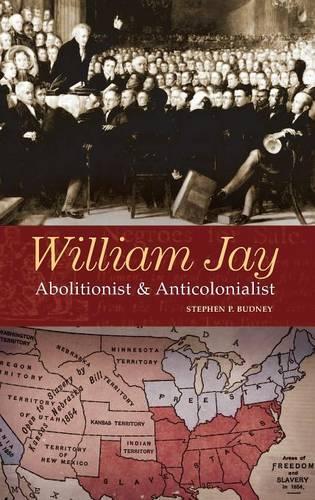
William Jay: Abolitionist and Anticolonialist
(Hardback)
Publishing Details
William Jay: Abolitionist and Anticolonialist
By (Author) Stephen Budney
Bloomsbury Publishing PLC
Praeger Publishers Inc
28th February 2005
United States
Classifications
Professional and Scholarly
Non Fiction
Slavery, enslaved persons and abolition of slavery
Colonialism and imperialism
National liberation and independence
306.3620973
Physical Properties
Hardback
200
Width 156mm, Height 235mm
425g
Description
A founder of the New York Anti-Slavery Society, William Jay was one of the most prolific and influential abolitionists of his day, yet Americans know little about him. This is the first extensive examination of his life and work in over 100 years. Like many of his contemporaries, Jay looked at a rapidly changing America and it frightened him. As a conservative social reformer, it was not merely sinfulness that alarmed Jay, but the perception that America was betraying its founding principles. From his early involvement in local temperance societies to his conversion to the cause of immediate abolition of slavery, Jay would emerge as one of the most influential reformers. A fierce and vocal opponent of the efforts to repatriate blacks to Africa as well as the U.S. annexation of Northern Mexico, Jay stood at the center of the abolitionist and anticolonialist movements. The son of founding father John Jay, William Jay felt an obligation to help purify America so that it could continue to adhere to the republican principles that had helped create it. Not only does Budney examine the motivation for multifaceted reform, he also probes how advocates of abolition, peace activists, and temperance attempted to craft their appeals to influence the greatest number of people. Many scholars have attributed the vitality of the reform movementparticularly the abolitioniststo the more radical elements such as the Garrisons; however, most reformers would have preferred a more gentle approach to persuading Americans of the veracity of their efforts.
Reviews
William Jay, the son of America's first chief justice, John Jay, is a significant but overlooked figure in the annals of antebellum reform. In this short but important book, Budney maintains that Jay was led to reform by his religious convictions, his republican principles, and his father's humanitarian example. Early in his career, he was active in religious benevolence and in the peace movement. He was sympathetic to, but remained aloof from, abolitionism. Budney asserts that it was the antiabolitionist riots and racial violence of the 1830s that galvanized Jay to activism. He endorsed the newly formed American Antislavery Society and denounced the American Colonization Society's efforts to colonize freed African Americans in Africa. Although never as radical in his speeches and writings as William Lloyd Garrison and his followers, Jay condemned the annexation of Texas and the war with Mexico as examples of a conspiracy to spread slavery in the West. Jay remained active in both the antislavery and peace movements until his death in 1857. Budney's book restores Jay to his rightful place in the abolitionist movement and helps the reader understand the complexity of antislavery. The bibliography enhances the book's worth.Recommended. All levels/libraries. * Choice *
Stephen P. Budney's insightful biography of William Jay (1789-1857) extends the historiography of abolitionism beyond well-worn tales of Garrisonian reformers in antebellum New England.Jay is fortunate to have found a sympathetic and probing biographer whose compact book brings both conservative abolitionists and the American nation-state back into the story of antislavery activism. * The Journal of American History *
Author Bio
Stephen P. Budney is Professor of History at Pikeville College. Born in Connecticut, he studied history at the University of Maine and the University of Mississippi.
